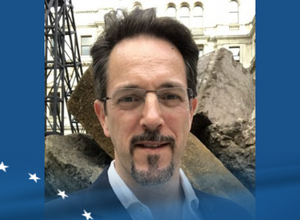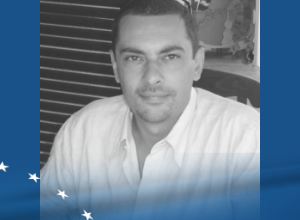2022
2nd EPA Online Talks with Experts
The second session of “Online Talks with Experts”, organised in collaboration between the Early Career Psychiatrists Committee and the EPA Section on Digital Psychiatry, took place on 30 May 2022.
Focused on the topic of “Telepsychiatry and digital psychiatry instruments: how to apply them in clinical practice”, Prof. Umberto Volpe, EPA Board Member, and member of the Committee on Education and Chair of the Section on Digital Psychiatry had a lively exchange with the 35 participants who had the opportunity to ask open questions related to the impact of digital psychiatry in the daily practice of mental health professionals, the evolution of digital mental health care, the importance of guidelines and instruments in telepsychiatry.
Some examples of questions asked during the session:
- How do you think the role of a psychiatrist will change in years to come, as telepsychiatry and digital psychiatry instruments become more and more relevant to daily practice?
- Do you have or plan to elaborate some guidelines?
- What are the main differences when using digital psychiatry during a Covid-19 lockdown or in a context of war?
- Do you have advice on how to keep your personal mental health working up to 8 hours a day online? Don’t you think it’s difficult to stay focus?
Prof. Volpe explained the digital evolution of mental health care, particularly with the arrival of the Covid-19 pandemic that completely changed the practice of psychiatrists. If telepsychiatry was rarely used before, it has become a necessity and a norm nowadays. Even though digital has evolved, the need of training in this field should not be neglected to ensure proper use of instruments in clinical practice.
1st EPA Online Talks with Experts
The first session of “Online Talks with Experts”, organised in collaboration between the Early Career Psychiatrists Committee and the Committee on Ethical Issues, took place on 15 February 2022 on the topic “Digital Threats: new media and the assault on knowledge.”
The session, attended by 28 participants from different countries, took place on Zoom and was chaired by Dr. Egor Chumakov, member of the Early Career Psychiatrists Committee and chair of the Task Force on Communication and Publications.
 The invited speaker was Dr. Jan Wise, member of the EPA Board and the EPA Committees on Education and on Ethical Issues, as well as being a member of the British Medical Association Ethics Committee. Jan Wise opened the presentation with an overview on the impact of misinformation and fake news and how to deal with propaganda. Some examples of current global issues were cited along to argue on how dangerous digital medias can be for healthcare. At the end of the presentation, some recommendations were advised on how to know if a source is reliable by highlighting the importance of the active role of health organizations and health bodies.
The invited speaker was Dr. Jan Wise, member of the EPA Board and the EPA Committees on Education and on Ethical Issues, as well as being a member of the British Medical Association Ethics Committee. Jan Wise opened the presentation with an overview on the impact of misinformation and fake news and how to deal with propaganda. Some examples of current global issues were cited along to argue on how dangerous digital medias can be for healthcare. At the end of the presentation, some recommendations were advised on how to know if a source is reliable by highlighting the importance of the active role of health organizations and health bodies.
At the end of the presentation, participants had the opportunity to ask open questions and have instructive exchanges. The reflective questions were related to the qualities of truth in the mental health care, the importance of the legislation around mental health, and the role of the psychiatry on patients.
Some examples of questions asked during the session:
- What do you think the truth is? What if the truth is subjective? How can we determine which truth is objective by the biases of different opinions?
- Do you think there are some situations when we can’t trust the information from a patient?
- How can health professionals help a patient without crossing the line?
- Do you think that empathy is essential to digital psychiatry? Is it possible to be a psychiatrist without empathy?
Jan Wise emphasized the place of mental health professionals and the importance of medical approaches that can have an impact on the career of a psychiatrist: “We will never run out of patients, but we will run out of doctors”, he said to aware that psychiatrists may compromise their role by ‘crossing the line’ in treating a patient.
When asked about how to determine the accuracy of a patient’s symptoms, Dr Wise said that “Just because something doesn’t happen, doesn’t mean it’s not real for them”, to point out that a patient exaggerating its symptoms is a recurrent fact, but the role of the psychiatrist “is take the steps with them”. On the role of empathy in psychiatry, he attested that “Doing things right doesn’t require empathy, being a leader does”, to insist on the impact of psychiatrists on mental health care.
By the end of the session, Jan Wise encouraged early career psychiatrists to continue reflecting on these questions today to help develop the psychiatry tomorrow.

